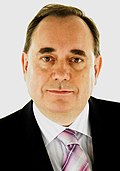| |||||||||||||||||||||||||||||||||||||||||||||||||||||||||||
All 1,222 seats to Scottish councils | |||||||||||||||||||||||||||||||||||||||||||||||||||||||||||
|---|---|---|---|---|---|---|---|---|---|---|---|---|---|---|---|---|---|---|---|---|---|---|---|---|---|---|---|---|---|---|---|---|---|---|---|---|---|---|---|---|---|---|---|---|---|---|---|---|---|---|---|---|---|---|---|---|---|---|---|
| |||||||||||||||||||||||||||||||||||||||||||||||||||||||||||
 Colours denote the winning party with outright control | |||||||||||||||||||||||||||||||||||||||||||||||||||||||||||
Local elections were held in Scotland on 6 May 1999, the same day as First Scottish Parliament elections. It was the second election for all 32 Scottish councils and the first after a major review into all wards.



